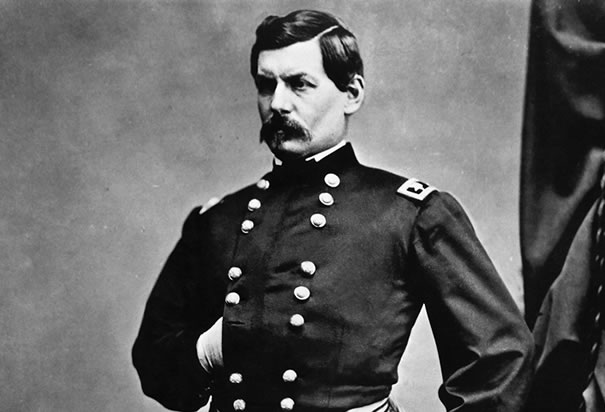The Rise and Fall of George McClellan in the Civil War
‘Little Mac,’ or ‘young Napoleon’ are all great names used to describe McClellan as a memorable organizer in the Union Army in Potomac (Hickman, 2012). McClellan was very famous among the men that served under his command. The great achievements about his way of command was however not popular amongst all and his ways of operation challenged his good relations with great men such as President Abraham Lincoln. This challenge greatly upset his political and military career. McClellan’s great career began in 1842 when he joined the United States (US) Military Academy. McClellan graduated second from the academy in 1846 from a group of 59 graduates. Twenty of his classmates later advanced to the ranks of generals within the military. In his fits of success McClellan was appointed as a lieutenant in the Corps Engineers, where he worked under General Scott in the period of the Mexican-American war. While in service McClellan helped in the making of roads and bridges during the periods of service (Hickman, 2012). McClellan received promotion to captain and lieutenant after which he returned to West Point where he served thereafter as an instructor. In the post-war period he made translations on a bayonet tactics from a French Manual into English. McClellan also served as an engineer at Fort Delaware. He also took part in expeditions to explore the Red River. Additionally, he took part in the exploration of routes that would later make up the transcontinental railroad. In the Crimean War McClellan served as a military observer and thereafter he tendered his resignation from the US military and took up a position in Illinois Central Railroad authorities.
McClellan’s streak of success and defeat of McDowell at the First Bull Run became major factors, which contributed to his attainment of the position of commander of the Potomac Army. He later was promoted to General-in-chief of the Federal Armies. McClellan served well as a general till 1862 when he was relieved off his duty as a general. McClellan launched a massive campaign against the confederate army and capital in the Peninsula campaign. This was mainly due to pressure from Lincoln, who seemed to favour a more assertive and offensive approach to the war. On the other hand, McClellan seemed to prefer a more withdrawn and tactical approach to war with delayed, but calculated attacks (Waugh, 2011). McClellan was continually tricked by General Johnston that he was up against a larger force. This made McClellan delay his attacks as he made calculative moves. Unfortunately, this granted his opponents more time to make retreat towards Richmond. These slowed down moves put McClellan at odds with Lincoln, who was in favour of a more aggressive and offensive approach in dealing with the confederate army. The Battle of Seven Pines dealt his campaign a big blow and even though his army was able to repulse the attacks, the events slowed down his advance. After these events McClellan went on to wait for reinforcements from Washington-a choice that further slowed advance and allowed the enemy forces to better their campaign (Hickman, 2012). McClellan cautious streak gave the enemy ample time to regroup and fiercely attack the Potomac Army. Finally, the series of continuous attacks on McClellan’s army in the Seven day’s Battle rendered the Army of Potomac powerless forcing them to retreat to Washington. This led to the eventual failure of the campaign and the loss of favour from Lincoln. As a result, Lincoln named Henry Halleck as the General-in-chief in place of McClellan (Waugh, 2011). McClellan’s cautious approach to the war and slow planning was the major problem that put him at odds with his commander-in-chief (Lincoln). Lincoln finally relieved him off his post stating that “If he can’t fight himself, he excels in making others ready to fight (Waugh, 2011).” The meticulous nature in his preparations and plans hindered McClellan’s ability to go up against more aggressive enemies. His tactics proved to be very slow for a fast moving enemy and battlefield, and his caution and regular overestimation of the enemy rendered him slow. McClellan’s obsession with caution and maintenance of reserves made him not eliminate General Lee’s offensive and even though he was able to repulse his attacks, this did not make Lincoln happy (Waugh, 2011).
McClellan’s approach proved to be totally different from an amore offensive and engaging approach that was favored by Lincoln. The final battle with Lee’s forces was inconclusive, but technically Lee was defeated because he was the first to withdraw from the war. This inconclusive win made McClellan to wire to Washington claiming victory by driving the enemy back. This was an incomplete victory because all along Lee had been fighting with a much smaller army, and had he decided to rekindle attacks at this point of success for McClellan, he would have definitely outmaneuvered his strategy. Lee may have actually outmaneuvered McClellan because he failed to use his cavalry forces for reconnaissance (Waugh, 2011). Additionally, McClellan’s headquarters was too far behind the battle line, and this made him less able to have a more direct and fast control of the war. His lack of sharing with his corps commanders also prevented them from making initiatives outside their sectors-a crucial element that would have enabled them to outmaneuver General Lee (Waugh, 2011). However, the end of the battle concludes General Lee’s tactical approach in using various fronts simultaneously to make definitive attacks that rendered his approach tactful. In conclusion it may be said that McClellan fought the war tactfully too, but failed to develop and maintain the aggressive nature necessary to grant him decisive victory and this can be seen in the failure to aggressively pursue General Lee after his defeat and withdrawal after the Battle of Antietam.
References
Hickman, K. (2012).American Civil War: Major General George McClellan-“Little Mac.” Retrieved on 23rd June 2012 from http://militaryhistory.about.com/od/americancivilwar/a/McClellan.htm
Waugh, C. J. (2011). Lincoln and McClellan: The Troubled Partnership between a President and His General, Palgrave MacMillan




